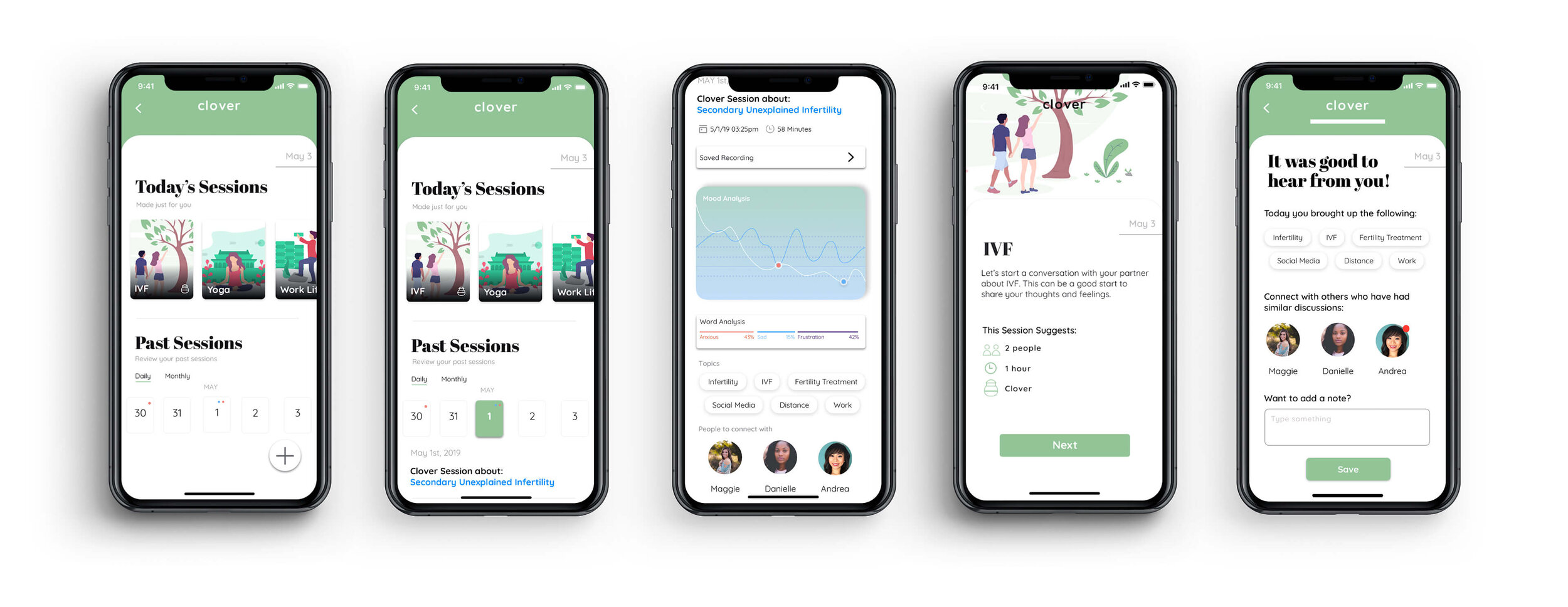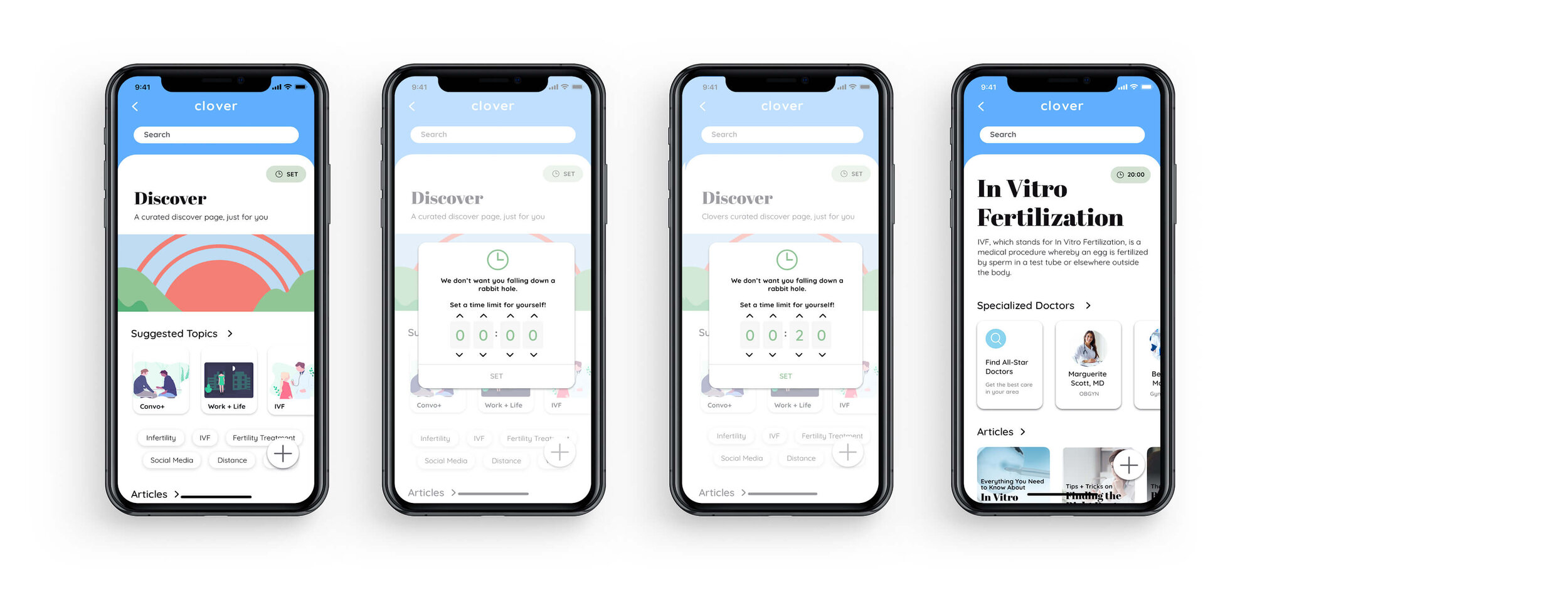CLOVER
Description
Clover is a digital social platform accompanied with an AI-powered guidance robot created to help couples combat feelings of isolation that stem from infertility. Clover encourages organic and meaningful communication between couples, and addresses the reality of the stress that infertility commonly brings to not only the couple as whole, but also the individual impact as well. Users can use the Clover app to track data, progress, and come in contact with other users who cope with infertility as well. Building these interpersonal relationships will help users feel more reassured and less alone as they deal with a big change in their day-to-day life. The Clover robot can be used to prompt important conversations to boost morale and encourage couples to speak from the heart, allowing vulnerability and compassion to bring each other closer, and helping each individual fully understand their partner’s struggles through open communication.
Problem
Trying for a child can be hard, and learning that infertility may be putting a halt on your progress can tend to add a lot more stress. Infertility has become a growing experience for many across the globe, and the stress that surrounds those circumstances can lead to a deterioration in communication, morale, and many surrounding relationships. Often, the coping mechanisms people turn towards during a difficult and inexplicable challenge like infertility can cause more issues in the long run, resulting in even more stress.
Research
Due to the deep emotional complexity of infertility, and the fact that all members of our team haven’t experienced the process of trying for a child, research was of utmost importance in understanding our issue at hand, our user base, as well as whatever design decisions we made moving forward. We spent the first five weeks researching the different facets infertility has on one’s life. This consisted of secondary research, surveys, competitor analyses, as well as interviews with people who experienced infertility and field experts.
Interview 1
In search of resources, I was able to get in contact with two neighbors back home who have dealt with infertility in different ways, and they were both kind enough to do a one-on-one interview with me. My neighbor across the street, Erin, had experienced infertility firsthand, after trying with her husband for their second child for many years. Hearing her story was both insightful and incredibly heartbreaking. Both her and her husband came from a religious background, and the desperation that infertility created made them question their own belief systems at different times, resulting in communication issues that put more pressure onto Erin and her marriage. There would be hopes of a missed period, but then it would show up a week late, and the repetition of disappointment and starting over again and again was taking a toll on her.
“It gets more stressful. And then for a while, once you get your period then you obviously know you’re not pregnant. So then that would leave five days just crying, and being even more upset. And then towards after whatever it made, like a year and a half, I said, you can have the day you start your period, to be upset and be mad, but you can’t be mad for five days every month.”
Her relationships with her friends also became strained; getting on social media, talking about children, and attending baby showers, it all just seemed to remind her of her own struggles. It was hard to attend events with friends and pretend like things weren’t hard at home. What started off as a difficult struggle became an isolating burden that Erin felt like no one could relate to. It wasn’t like that was something her friends talked about casually. She had no idea if they knew what it felt like to be in her shoes.
“Then getting on social media and just seeing all these people having babies, which didn’t bother me until we were about a year into trying and we just had no answers. That was the hardest thing. Nothing medically was wrong with either of us.”
Erin tried speaking to her husband, who was constantly busy with work and not home very often, about the chance of trying IVF, and at first, he had wanted nothing to do with the procedure. His belief was that if God wanted them to get pregnant, He would do it without any sort of interference. However, Erin’s husband could see how hard things were becoming for his wife, and he decided to think things through and give doctors a chance. Erin told me that she was given a letter from her husband that told her he had a change of heart — he believed that God had given doctors the gift to help people, and that he wanted to do whatever was best for his family, so he wanted to try the IVF process with Erin.
Interview 2
My other neighbor that I spoke to, Emily, is a local OB-GYN who specializes in delivering babies, and general gynecology practices. When I asked about her experience with patients managing infertility, she explained that there is a lot of frustration she deals with as a doctor — a lot of people come into her office expecting her to have all of the answers; the missing link that they’re needing to have a child of their own. It’s a common misconception that a simple procedure will solve all of their issues, give them a baby, and then they can just move on with their lives.
“...Just dealing with people’s unreasonable expectations sometimes. There’s a lot of people out there that, especially in the OB world, that really want to control the situation around the curve and sometimes they have a hard time understanding that there’s things that arise that you can’t control, you know, emergencies and things like that. And sometimes they’re just really unreasonable.”
Outside of natural conception, there are many ways to help couples conceive, most of which can be painful and/or incredibly expensive. There is adoption, which can be pricey and can be a legal challenge. There’s artificial insemination, which may not always work if one of the parents has symptoms of infertility. And then there is IVF, which is a very common treatment that may be chosen to possibly counteract infertility. A lot of the time, if couples decide to try IVF, the hormones and procedures required for the process can lead to intense side effects, including bloating, headaches, mood changes, painful cramping, and breast tenderness. Research showed this having a large impact on an individual’s self esteem. There is no guarantee that this treatment will bring results. IVF can lead to miscarriages, premature delivery, multiple births (such as twins or triplets), and even cancer. It’s a big risk to take, with little promise for things to go according to plan. Understanding these side effects and taking these risks, combined with a concoction of hormones, it’s not uncommon for mothers to struggle with mental health issues. Stress is associated with reduced sperm quality in men, and appears to have a modest negative impact on fertility treatment outcome for women.
Affinity Insights
During the infertility treatment, couples collect a lot of stress and don’t know how to manage it
Females tend to carry a lot more of the pressure
Infertility can cause a rift between both partners
Couples consider the fertility process as duty rather than a journey, which makes it unenjoyable
Male partners feel they are not fully involved within the process
How might we…
Build a stronger relationship with couples during the infertility process?
Let the partner feel helpful, and useful during the process of infertility?
Bridge difficult conversations with their partner, friends and family?
Facilitate important conversations that are productive and effective?
Separate the negative feelings of infertility from important parts of their life?
PERSONAS
User Journey Map
User Flow
MidFi Prototype
HiFi Wireflow
Mobile App
The mobile app was created to prompt conversation, keep track of progress and data, and provide support to the users through social avenues and curated information. The home screen shows a quick overview of daily sessions, topics and connections. Sessions cover daily topics, conversations, or activities for a user and their partner. The Discover Page lets users learn more about topics they’ve mentioned in session, and also connects users with other people who are going through similar situations.




AI-Powered Counselor
Our voice assistant, Clover, is a communication mediator and healing tool for couples going through infertility. Clover uses machine learning to establish healthy and productive conversation habits to assist with facilitating tough conversations. Clover also suggest topics, and activities for the couple, or the individual.
Key Adjectives
Warm
Understanding
Helpful
Intelligent
Friendly
Description
When speaking to our VUI, it responds in an understanding, warm ton to help the user understand they're being heard and listened to. It is intelligent and gives helpful, guided advice. Not overbearing or pushy, but well balanced.
Clover learns responses based off of healthy and productive conversations and language to better respond in sessions.
Voice Chosen
en-TTS US Female 1
Healthy/Productive Conversational Methods:
Give an appropriate level of detail that the receiver requires
Do not interrupt each other while they are speaking
Don’t avoid tough conversations
Commit to learn from whomever they are conversing with
Do not do all the talking
Be a good listener
Remember key points
Recognize and mirror other people's feelings, and emotions
Emotions
Because a comforting robot must be perceived as both secure and empathetic, Clover is designed to feel secure, easy to use, and reliable. To be empathetic, it listens, understands, and accommodates for the user. In order to create a social robot, Clover needs to be something people want to interact with. Sympathy towards it is a key point for acceptability. However, it will not be enough to stabilize long-term interaction. Beyond sympathy, we expect the robot to be able to offer empathy to build an effective bridge between the human and the robot. This is why we gave Clover emotions to represent a way to model different responses and thus provide the it with more believable and appropriate responses to the user.
Conversation Architecture

















